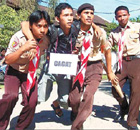Foreign and Military Affairs
Premier Wen at Copenhagen conference
(Xinhua News Agency/People's Daily)
Updated: 2009-12-25 17:14
 |
Large Medium Small |
Finally, at 11:30, the chair of the conference, Prime Minister Rasmussen, announced the opening of the event and invited Premier Wen to be the first to address the conference. Amid a big round of applause, the premier mounted the rostrum in his typical vigorous steps, looking calm, confident and determined. His speech, entitled "Build Consensus and Strengthen Cooperation to Advance the Historical Process of Combating Climate Change", contained a little more than 2,000 Chinese characters, but it was substantive, visionary and full of emotions.
The fair and reasonable principles outlined by Premier Wen represented the shared aspiration of developing countries. They were both realistic and forward-looking, and had taken into account the interests of all parties. They pointed the way forward at a decisive moment of the conference, gave a strong push to the efforts to safeguard and advance the negotiation process, and therefore received widespread endorsement.
A prolonged round of applause broke out from the audience. Some foreign leaders went to Premier Wen's place, shaking his hand and congratulating him on the speech.
"As long as there is 1% hope, we will exert 100% efforts." - At the critical moment when the conference faced the danger of ending with nothing, the Chinese government helped make the Copenhagen Accord possible with extraordinary efforts.
China is the biggest developing country in the world while the United States is the largest developed country. The meeting between Premier Wen and President Obama naturally became the focus of people's attention.
The meeting was scheduled to take place after President Obama's speech at the plenary session. It was held in a makeshift room of a steel frame covered with drapes.
The two leaders exchanged views in a frank, in-depth and practical manner on the outcome of the conference, the long-term target, the MRV and other focal issues. They stated their respective views and also showed some flexibility. They agreed that the conference should speedily reach a political agreement and that China and the United States should maintain cooperation. They then instructed their chief negotiators to have further consultations and agreed to meet again later that day.
After the meeting, Premier Wen immediately instructed the Chinese negotiating team to brief the BASIC countries and G77 on the China-US meeting and encourage developing and developed countries to work together and expedite the negotiation process.
Developed and developing countries held consultations on the final document of the conference, yet it was still hard to make any progress due to the differences among parties. The scheduled closing time of the conference had long passed.
Some countries started to prepare statements in the event of a breakdown and leaders of a handful of countries even made irresponsible remarks, pointing fingers at China.












